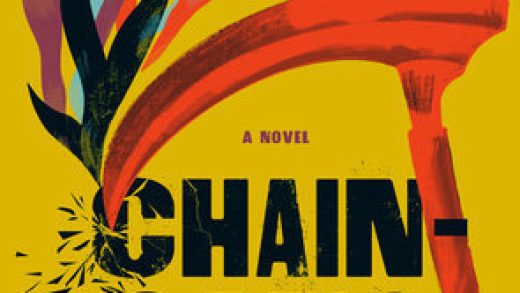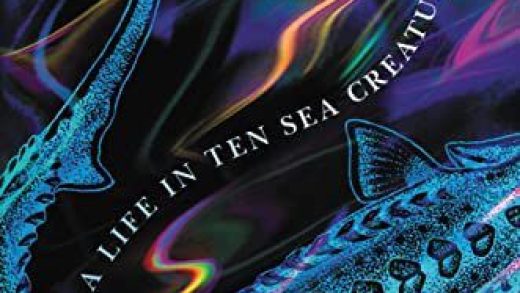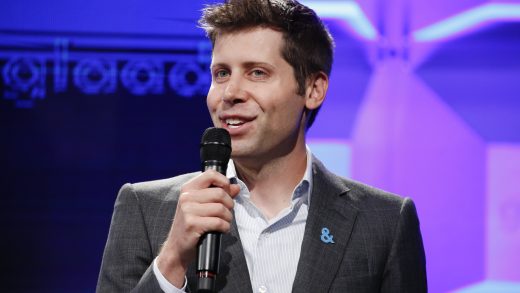A few months after giving birth to my son, a friend asked me how he was sleeping. “He’s sleeping,” I admitted, “but I’m not.” I kept waking up during the night, sure that I heard him crying when he wasn’t. My friend assured me that I wasn’t going crazy; she’d also heard phantom cries when her daughter was small—in fact she’d spent hours every night apprehensively staring through the bars of her daughter’s crib, monitoring her breathing.
Helen Phillips taps into this new parent anxiety in her second novel, The Need, the story of a young mother named Molly who is home alone with her two young children when she hears strange noises in her living room. As Molly confronts the intruder in her home, the lines between reality and interiority blur, and she finds herself grappling with her fears about parenting, her evolving identity, and the complex nature of grief.
Phillips is no stranger to speculative fiction. Her previous books, including the widely praised 2015 debut novel The Beautiful Bureaucrat, also explore the intersection between literary fiction and psychological thriller. Phillips has a knack for using the uncanny and bizarre to uncover deeper truths about humanity, and The Need mines the dissociative state of early parenthood to talk about the experience in a refreshingly original way. However you don’t need to have children to be gripped by Molly’s experience as she tries to protect her family from harm; Phillips has executed a sharply written novel that will unsettle you as it deftly pulls you along.
I had the pleasure of connecting with Phillips while she was on the California stop of her book tour to talk about living in a world filled with ominous anxiety, writing a book when you don’t have time, and why we need the great American breast pump novel.
Carrie Mullins: I’m always interested in where an author starts their book. What came to you first for this project? A character, a scene, a line?
Helen Phillips: I’m always fascinated by that question, too, because I feel like writers have such different answers to where they begin. I was on a panel not long ago, and one writer said plot and another writer said character, and for me the answer is image. I always begin with a series of images that I collect over a long period of time. And in addition to an image, I’d say there’s some kind of big question I have. To be more specific to this book in particular, there was a night when my daughter was a newborn and I was nursing her, and I thought I heard someone in the other room. It wasn’t anyone, but that flash of a feeling, that fear experience—I felt like OK, I have to write about this sensation of vulnerability. The book grew out of that moment.
CM: The fear in the opening pages is so visceral. I have a one-and-a-half-year-old, so it was definitely something that I related to.
HP: It’s gratifying to me that as I send the book out into the world, people can relate to it. Because there are moments when you feel like every other mother has it under control, and you’re the one who has these freaky thoughts. It’s been a relief to me that I don’t seem to be alone in that neurosis.
CM: Not at all! One of the things that struck me about The Need was how many little moments resonated with me. I feel like we’re living at a time when the conversation around parenthood is a lot more open than it used to be. People feel more comfortable sharing their experiences and challenges. Do you think that’s true?
HP: I wrote this from 2015 to 2018, and there is definitely more space for someone to say something complicated about motherhood than there was in the past. In general, I feel like part of the reason I write books is because I want to have a conversation about something, and that conversation begins as a conversation that I have with myself as I write. When it goes out into the world—and that’s where I am right now—it becomes a conversation with you, with others, and that’s opened up the conversation about motherhood for me in a more targeted way. I’ve had anxiety about the book being published because I feel very vulnerable, very laid bare emotionally even though the book is completely fiction.
CM: Molly is anxious about her children’s safety, but I feel like the theme of anxiety runs through the book and is treated in different ways.
HP: Yes, I don’t think it’s only a book for parents. An underlying feeling of ominous anxiety is something you can feel even if you don’t have children, and people connect to that element in the book. In a world where global warming is happening, aren’t we all feeling an ominous sense of anxiety rising all the time?
CM: In some ways I hope so because I wonder what the people who aren’t freaking out are thinking.
HP: I’m certainly freaking out. I’ve written a number of short stories with climate change as a theme, but my next book is really going to focus on that. And though this book isn’t about climate change, that underlying anxiety is the background. What you have in this book is everyday moments that are suffused with anxiety, and to me, that’s what climate change feels like.
CM: Molly finds herself traversing that porous boundary between the real and the unreal. You’ve explored these surrealist elements in your work before. Can you talk a little about how you approach world-building?
There are moments when you feel like every other mother has it under control, and you’re the one who has these freaky thoughts.
HP: For this book one of my goals, aside from the magical or speculative elements, was for everything to feel extremely realistic. I really wanted to capture that texture of having young children, and the daily labor of that, the daily labor of having a job, those tiny domestic moments with coworkers. I wanted it to feel very realistic so that when the speculative elements arise, you’ve already accepted the reality of the book. My rule was to have everything else be completely convincing and believable to our world and then this one thing would be convincing by association. I think of the book Exit West by Mohsin Hamid. Everything is very realistic, but then there are these magical doorways that allow people to jump to different places on the globe. I like the idea of one magical element.
CM: That book is great. Are there any other authors who are working in this space who you find inspirational or exciting?
HP: A book that I talk about all the time, and I will talk about it here because I love it so much, is Fever Dream by Samantha Schweblin. I just can’t recommend it highly enough. It has the forward momentum of a thriller, which is something I was trying to achieve in this book, and is so viscerally unsettling and is really raising deep questions about how much you can protect the people you love. In terms of people who are writing books that have different realities, Octavia Butler, Karen Russell, and Kelly Link. Ursula K. LeGuin, Italo Calvino—I mean there are so many and I could go on with an enormous list, but these are all writers I think about a lot.
CM: You just named so many fantastic and widely praised authors, but I still have to ask, do you ever find it challenging to sell people on this intersection between literary fiction and thrillers, or literary fiction with fantastical elements?
HP: We spoke about how space is opening up to offer more nuanced portraits of motherhood, and I think that, at the same time, space is opening up for more blending of genres into literary fiction. I think that someone like George Saunders has helped with that, and I feel like Colson Whitehead’s books do that, and it’s a very exciting thing. Even when I was in my MFA program from 2005-2007, I felt like what I was doing with the speculative elements was much more uncommon than it is now.
But I’ll add that, from my perspective, I don’t ever feel like I’m trying to convince anyone to be more open because I can’t write any other way. It’s the only way that’s exciting and interesting for me, and it answers the questions, “How am I going to portray these emotions? How am I going to use all the possible tools at my disposal to capture this anxiety?” Or I decide this anxiety has to be in the form of a thriller, because that’s what it feels like to have young children sometimes. I wanted to write about how your identity shifts when you have young children and how you become vulnerable to the possibility of losing them. So it comes very naturally to me, and I don’t know any other way to explore the things that I want to explore.
CM: I always love to hear that a writer is essentially writing for themselves.
If I wasn’t a mother, I couldn’t have written The Need.
HP: When my children were young—I mean they’re still young, they’re 7 and 4, but I feel like The Need really concerns the early years, which have their own special sleep deprivation and lactation situation—I wanted to read fiction about that. I’ve read some really great nonfiction about that time, like The Argonauts by Maggie Nelson and On Immunity by Eula Biss, but I wanted to read fiction that had breast pumps in it.
CM: Did you find anything? I’ve had trouble finding novels that really captured early motherhood.
HP: I don’t want to make a mistake, but at that time, I didn’t find fiction books that satisfied that need for me. People have recommended the book Afterbirth (by Elisa Albert) to me so that’s on my reading list, but I don’t think the great American breast pump novel has been written. We’re still waiting for that.
CM: I love that. I hope you write that book. And I agree—I mean I might definitely be missing something, but most of what I’ve seen has been in the non-fiction/memoir genres. It reminds me that I wanted to ask you about that infamous quotation by Cyril Connoly: “There is no more somber enemy of good art than the pram in the hallway.”
HP: I haven’t heard that quote before, it’s so depressing!
CM: I know, and it’s such an ingrained cliché: that motherhood is incompatible with being an artist.
I wanted to write about how your identity shifts when you have children and how you become vulnerable to the possibility of losing them.
HP: You hear that as a female artist and you feel like there are only two possible choices for your life, and you’ll have to give something up. I would counter that with a Sarah Manguso quote, which is along the lines of “I don’t want to read books written by people who have time to write books.” I love that so much and I think of it all the time.
I teach full time at Brooklyn College, and during my semesters if I’m lucky I get to carve out 5 hours a week, like one hour each weekday morning. I wrote The Need in these little scraps of time and I think that urgency is present in the book. I think there is an energy that comes from writing a book when you don’t really have time to write one, and if you write a book when you don’t have time, it means you care about it so much that you are making time. So when I think, “How can I call myself a writer if I’m only doing it five hours a week?” that quote keeps me going.
I also want to add that if I wasn’t a mother, I couldn’t have written The Need. My children are detrimental to my work because they take up so much time and energy, but they also bring such bounty to my work, and the experience of love that I experience because of them, I wouldn’t be the writer I am without that.
CM: I agree. I’ve found that parenthood has put me much more in touch with humanity, with the universal, primal human experience, whereas before I was more enclosed in my own self bubble. The irony is that motherhood is often treated as an experience whose interest or importance is limited to females.
HP: Right, and The Need is about motherhood but also about so many other things, like can you ever take someone else’s grief as seriously as your own grief? It’s about loss, and the way as a human your life shifts among different possibilities.
CM: Have you felt gender bias with this book, for example how the publisher might want to market it?
HP: That’s an interesting question. I think the main thing is that I want the questions about motherhood to be taken seriously. The only other thing I can think of is the cover. The initial cover had pink flowers instead of ferns, and I really said no to that because it might be silly, but I think pink flowers are associated with women and it just felt like men would be less likely to pick up a book that has huge pink flowers.
CM: I think book covers really do influence buyers. I’m so fascinated with them!
HP: Me too. But I’m pleased with the ferns, I love the cover.
CM: Have you ever thought about your kids reading The Need one day?
HP: I definitely have. They were at my book launch at Greenlight and they heard me read the first chapter. My 7-year-old daughter gave a cute introduction that night. When they’re older and approaching parenthood, if they decide to have children, I hope that what comes through is what that love feels like that you have for your children, because it’s really hard to articulate. I don’t know if I successfully articulated it in the book, but it’s a love that goes hand in hand with so much dread that something could happen to them. It’s so intense and scary, and it’s not just tulips and butterflies. It’s an intense, bloody, amazing thing. So I hope the force of that is what will strike them and not just, you know, all the scary things their mother thought when they were small.
The post The Great American Breast Pump Novel appeared first on Electric Literature.
Source : The Great American Breast Pump Novel










